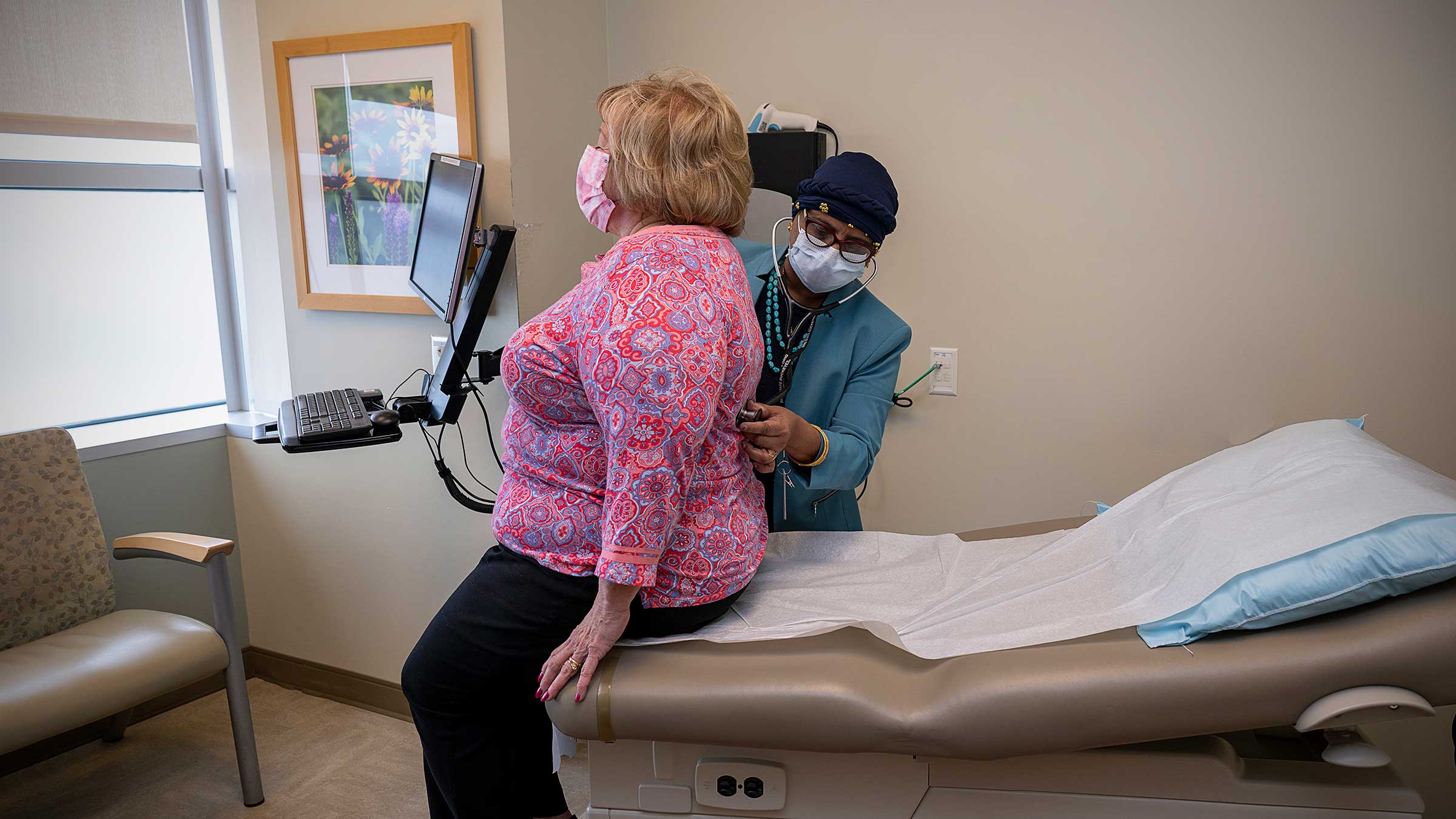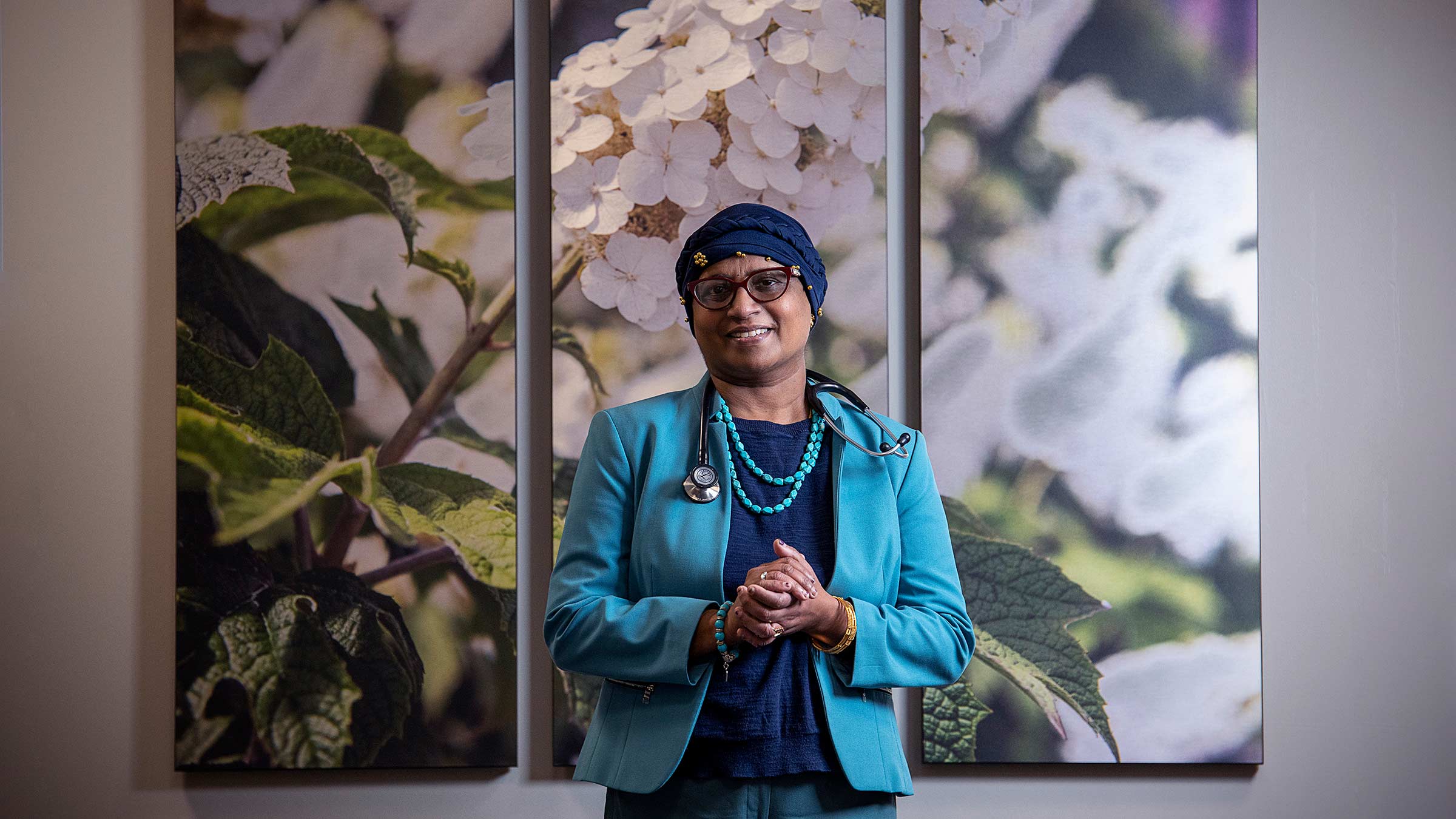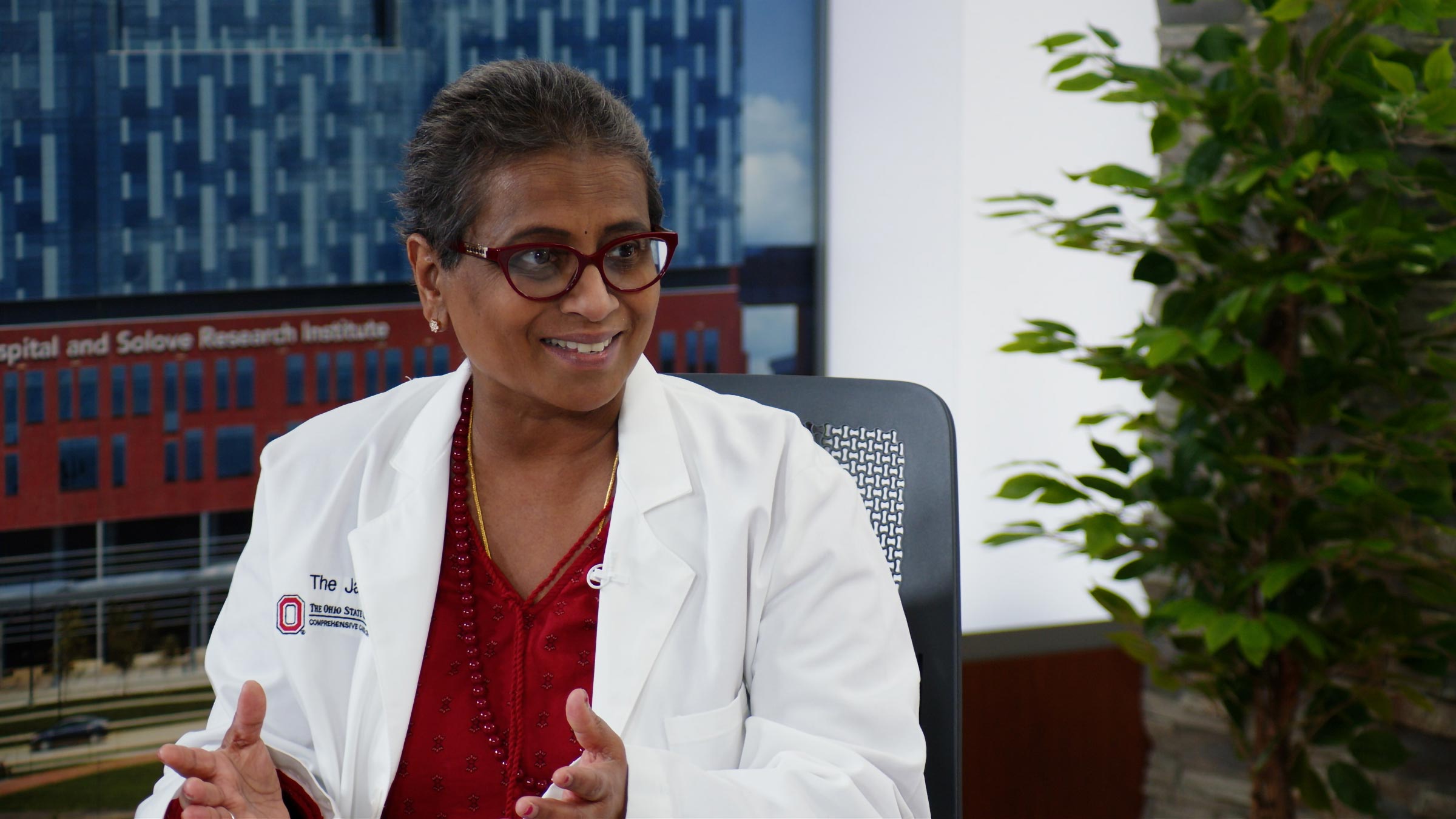Oncologist’s own breast cancer diagnosis strengthens unwavering devotion to patients
Bhuvaneswari Ramaswamy, MD, has a renewed understanding and drive to help her patients with breast cancer.
Editor’s note: Since the publication of this story, Dr. Ramaswamy passed in June 2024 after her heroic battle with metastatic breast cancer. You can make a contribution to continue the valuable research she started and honor her memory.
Bhuvaneswari Ramaswamy, MD, extends her hand. It’s fine to shake hands with her, she says. People sometimes hesitate these days, concerned about passing along germs.
“You don’t have to worry. Everybody is worried about me. My counts are all good.”
She’s talking about white blood cell levels, an indicator of how strong her immune system is. She wears a brown cap that completely covers her scalp, a flowery blouse and a necklace of multicolored ceramic beads.
Putting her backpack on the table, she sits down and sighs. A new medication leaves her tired and parched. She reaches for her water bottle and takes a few sips.
“I forget,” she says, about drinking water throughout the day. “And yet, I tell this to my patients all the time.”
Until recently, she hadn’t given much thought to how her advice applied to herself as well.
“It’s all new,” says Dr. Ramaswamy, a breast oncologist at The Ohio State University Comprehensive Cancer Center – Arthur G. James Cancer Hospital and Richard J. Solove Research Institute (OSUCCC – James) and clinical professor of Internal Medicine at The Ohio State University College of Medicine.
Breast cancer diagnosis, a ‘painful irony’
A cancer diagnosis still feels new, though it’s been about seven years since Dr. Ramaswamy discovered, while taking a shower one morning, she had a lump at the top of her right breast.
About a year before, she’d had her first routine breast exam and screening mammogram. It came back normal. But then in 2016, she lay in the exam room where she had diagnosed so many patients, consoling them and offering confidence that together they would fight their cancer. She asked a colleague to feel the lump, and just as she did, her colleague uttered an expletive and Dr. Ramaswamy knew.
Over the next week, she would learn the tumor was a very rare and particularly aggressive type, triple negative neuroendocrine breast cancer. After more than a decade treating patients for breast cancer and researching triple negative breast cancer, she became a patient of the very disease she knew so much about. It was a painful irony.
But that’s not how she thinks about it.
“Why shouldn’t it be me?” she says. “It could happen to anyone.”
And many have it much worse, she says of her patients burdened by the cost of cancer treatment and mothers in their 30s and early 40s with young children they fear leaving behind. All three of Dr. Ramaswamy’s children are adults living on their own.
For Dr. Ramaswamy, keeping the focus on the next patient awaiting her in the exam room helps her walk through her own experience with cancer. From it, she’s gained an even deeper level of empathy for what her patients have long talked to her about. She knows the hassle of taking so many medications every day. She knows what it’s like to lose feeling in her feet and hands, to have trouble buttoning a blouse. She knows the cough that seems to linger.
As she puts it: “I’m one of them now.”

Driven to support patients with breast cancer
A year after her cancer diagnosis, Dr. Ramaswamy was among 27 breast oncologists across the nation recognized by Forbes magazine as exemplary physicians in the field of breast medical oncology. A fervent advocate for patients, she’s also an inspiring and dedicated mentor to junior faculty and a supportive colleague.
To help patients newly diagnosed with metastatic breast cancer (cancer that spreads to other parts of the body), Dr. Ramaswamy founded the Living Well With Advanced Breast Cancer Clinic at Ohio State. Along with their regular physician visits, patients can go to the clinic to meet with a medical oncologist, integrative oncology expert, palliative care physician, nutritionist and nurse specialist. The clinic is designed to help patients learn about their disease, the advances in their subtype of cancer, the importance of clinical trials and how they can manage symptoms and live well with their cancer.
“She’s always willing to go above and beyond for her patients, making sure they know their options and that they’re getting the latest and best treatments available,” says Lindsey Radcliff, MS, BSN, RN, a nurse manager who’s worked with Dr. Ramaswamy for the past 11 years.
“She tries to present the patient with more than one option.”
Knowing some of her patients have limited means of getting to and from appointments, Dr. Ramaswamy accommodates them when she’s able, seeing a patient virtually or meeting them in the evening hours if that fits better into their schedule, Radcliff says.
Shaping our understanding of breast cancer, beginning in the research lab
As a member of the OSUCCC – James Translational Therapeutics program, Dr. Ramaswamy has focused her research on breast cancer prevention. She’s studied breast tumors at the molecular level to identify characteristics that lead to resistance to hormone-based therapies, to help understand why nearly a third of patients with breast cancer develop a resistance to conventional therapies that had earlier worked for them. She, too, has extensively researched why people of color get the more aggressive types of breast cancer at much higher rates and have lower rates of survival compared to patients in other race groups.
With the goal of spurring more breast cancer research at Ohio State, she and her husband, Chakravarthi Ramaswamy, MD, a kidney specialist, started an endowment this year: The Ramaswamy Family Endowed Fund for Breast Cancer Translational Research. The Ramaswamys hope their $300,000 gift to The Ohio State University Foundation will attract more donations and spur additional studies to improve the survival rate and quality life for people who experience breast cancer and to reduce racial disparities in who gets and survives the disease.
“It’s important to know why, among people with similar characteristics, some respond well to current therapies, fighting off cancer, and some don’t. That way we can help even more patients fight this disease,” she says.
Breast cancer diagnosis an ongoing struggle
A few years after being diagnosed and treated for breast cancer, her neuroendocrine cancer recurred, then in 2022, doctors discovered Dr. Ramaswamy had a second rare type of cancer, T-cell lymphoma.
Through all of her treatments, Dr. Ramaswamy has taken only short periods of time off from seeing patients.
“Living with cancer, dealing with my own uncertainties and side effects is surreal,” Dr. Ramaswamy says. “But caring and comforting my patients, being their advocate and doing my best, along with my team, gives me the positive energy to live happily with a purpose — despite my health issues.”
 Her patients are the reason she became a breast cancer oncologist. At first, she thought she wanted to treat blood disorders and perform bone marrow transplants. But in her fellowship, as she treated patients with breast cancer — mostly women — she felt a calling.
Her patients are the reason she became a breast cancer oncologist. At first, she thought she wanted to treat blood disorders and perform bone marrow transplants. But in her fellowship, as she treated patients with breast cancer — mostly women — she felt a calling.
“These are the women I want to work with,” she thought at the time. “Women who come in with a lot of worries. Women fighting to live well for their families, for their children.”
Now, continuing to see her patients keeps Dr. Ramaswamy from focusing on her own struggles, her own mortality, she says.
“If I find myself sitting inside a patient’s room and thinking about myself, I will quit working,” she says.
Parting with the wig she used to wear, these days Dr. Ramaswamy dons a hat that covers her head where dark hair slowly grows back. It’s an immediate sign to her patients she’s one of them. They ask her how she’s doing. They send chocolate and scarves and many cards thanking and encouraging her.
“It’s a two-way street,” she says. “My patients give me so much purpose, positivity and love that feeds my well-being. Sometimes I think I’m selfish not wanting to give that up.”
Even amid her own struggle with cancer, Dr. Ramaswamy’s level of commitment to patients shows what she does isn’t work to her, but instead a true devotion, says Amir Mortazavi, MD, co-director of the Division of Medical Oncology at the OSUCCC – James.
“She never says no when people need her,” says Dr. Mortazavi.
“She’s always willing to do more than her part,” he says. “If anything, an argument might happen if you ask her to do less.”

Taking her own advice with breast cancer diagnosis
As distressing as her experience with cancer has been, Dr. Ramaswamy remains optimistic she’ll be able to extend her time to see patients, to be with family and friends. Her experience with advanced stage cancer inspired her middle child, a resident physician at Vanderbilt University, to pursue research in cancer. In an essay he wrote in the journal The Oncologist, Rahul Chakravarthi Ramaswamy explains how he’s come to understand the notion of living with cancer in light of his mother’s experience.
“I now know that we are not fighting against death, but rather we are fighting for more meaningful time,” he wrote.
“Our own mortality is not the enemy; in fact, it becomes the very idea that gives our life meaning. My mother is a testament to this, inspiring us by continuing to live well with advanced disease.”
Part of living well, for Dr. Ramaswamy, is doing what she has told her patients to do: “Don’t spend your days dying. Spend your days living.”
At the urging of her husband, her children and colleagues, Dr. Ramaswamy recently slowed the pace of her work life a bit. She’s taken weeks off at a time to travel with family members to India, Italy, the Dominican Republic, Seattle.
“I keep my suitcase out,” she jokes.
She’s bought journals to fill, for her children, but she’s not ready to write in them. Not yet. Another patient is waiting to see her.

Your support fuels our vision to create a cancer-free world
Your support of cancer care and pioneering research at Ohio State can make a difference in the lives of today’s patients while supporting our work to improve treatment and reduce cases tomorrow.
Ways to Give




